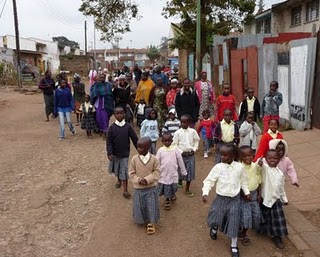

Today I got a heartening phone call from the school. The teachers exclaimed to me that is just one month of experiencing our incredible curriculum our students are a full year ahead of their peers in traditional Kenyan schools. In just one month so much has happened.
45 little girls run to school, eager for 7:30 to come around and the day to begin. School itself is “magic,” as four-year-old Lillian Achieng told me. As Lillian said, “at school life is fun.” The children learn through exploration, undertaking science experiments in the garden’s soil and writing stories about their own lives. In only one month all of our students can identify colors and shapes in English, and write their own names. Many are beginning to speak English instead of Swahili, preparing them for a life outside of the slum.
Each day our children also eat a healthy meal of maize and beans. This is their only meal that they can count on eating each day. It costs a mere $00.20 per child, per day. Imagine if everyone reading this blog spent $00.20 less on food a day… we could fund our feeding program for a year. Indeed, our feeding program costs a mere $175.00 per month. Along with this program we are teaching our students about nutrition and sustainable agriculture. Because of this food our students can focus in class. Because of this food our HIV positive students can take their medication. Integrating nutrition education into our curriculum is a cornerstone of our philosophy. Now that we are back in the US we are working tirelessly to secure funding for the continuation of this program. Anything, even $00.20, makes a difference. This fact continues to amaze me as I think about how much we spend on food here in America. Making a difference in the lives of our children is so very easy.
We now get very detailed weekly reports from the school and are therefore able to keep up with the amazing progress. The sustainable garden is coming along (see the photo above.) The biodigester will be breaking ground next week. There are four parents interested in learning about this green technology. The engineers will be teaching them, engaging them in this process. The biodigester will provide jobs for the community while it is being constructed, and will put the Kibera School for Girls at the forefront of educational programs based on sustainable education.
